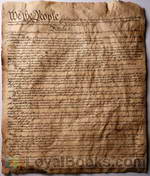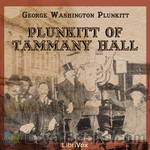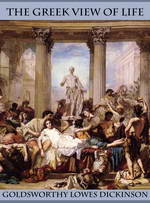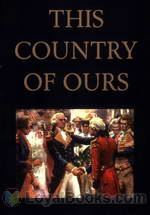|
Books Should Be Free Loyal Books Free Public Domain Audiobooks & eBook Downloads |
|
|
Books Should Be Free Loyal Books Free Public Domain Audiobooks & eBook Downloads |
|
Books on Politics |
|---|
|
Book type:
Sort by:
View by:
|
By: Eugene V. Debs (1855-1926) | |
|---|---|
 Labor and Freedom
Labor and Freedom
"While there is a lower class I am in it; While there is a criminal class I am of it; While there is a soul in prison I am not free." ( Eugene V. Debs) This collection of essays charts the thought and character of Eugene V. Debs. Debs was an influential early American labor leader, a founding member of the Industrial Workers of the World (IWW), and a Presidential candidate for the Socialist Party of America. In these essays, Debs employs his characteristically fiery rhetoric in a spirited defense of worker's rights, organized labor, women's suffrage, class solidarity, and the principles of economic socialism. | |
By: F. J. C. (Fossey John Cobb) Hearnshaw (1869-1946) | |
|---|---|
 Freedom In Service Six Essays on Matters Concerning Britain's Safety and Good Government
Freedom In Service Six Essays on Matters Concerning Britain's Safety and Good Government
| |
By: Fabian Franklin | |
|---|---|
 What Prohibition Has Done to America
What Prohibition Has Done to America
In What Prohibition Has Done to America, Fabian Franklin presents a concise but forceful argument against the Eighteenth Amendment of the U.S. Constitution. Beginning in 1920, this Amendment prohibited the sale and manufacture of alcoholic beverages in the United States, until it was repealed in 1933. Franklin contends that the Amendment “is not only a crime against the Constitution of the United States, and not only a crime against the whole spirit of our Federal system, but a crime against the first principles of rational government... | |
By: Founding Fathers of the United States | |
|---|---|
 The Constitution of the United States of America, 1787
The Constitution of the United States of America, 1787
The Declaration of Independence was signed on July 4, 1776. It announced that the thirteen American colonies, who were at war with Great Britain in the American Revolutionary War, no longer considered themselves part of the British Empire. They now called themselves a new nation, The United States of America. This famous document went on to become a well-known keystone of the human rights movement. However, the newly formed state had no real identity or philosophy and were merely a loose collection of states that had freed themselves from colonial rule... | |
 The Declaration of Independence of the United States of America
The Declaration of Independence of the United States of America
Declaration of Independence is the document in which the Thirteen Colonies declared themselves independent of the Kingdom of Great Britain and explained their justifications for doing so. It was ratified by the Continental Congress on July 4, 1776. | |
By: Frances Burney (1752-1840) | |
|---|---|
 The Wanderer
The Wanderer
This is the fourth and final novel by Fanny Burney, the author of Evelina, Cecilia, and Camilla. "Who is "Miss Ellis?" Why did she board a ship from France to England at the beginning of the French revolution? Anyway, the loss of her purse made this strange "wanderer" dependent upon the charity of some good people and, of course, bad ones. But she always comforts herself by reminding herself that it's better than "what might have been..." This is not only a mystery, not at all. It's also a romance which reminds readers of novels by Jane Austen... | |
By: Francis Bacon (1561-1626) | |
|---|---|
 The New Atlantis
The New Atlantis
In 1623, Francis Bacon expressed his aspirations and ideas in New Atlantis. Released in 1627, this was his creation of an ideal land where people were kind, knowledgeable, and civic-minded. Part of this new land was his perfect college, a vision for our modern research universities. Islands he had visited may have served as models for his ideas. | |
By: François Hotman (1524-1590) | |
|---|---|
 Franco-Gallia Or, An Account of the Ancient Free State of France, and Most Other Parts of Europe, Before the Loss of Their Liberties
Franco-Gallia Or, An Account of the Ancient Free State of France, and Most Other Parts of Europe, Before the Loss of Their Liberties
| |
By: Frank B. Lord | |
|---|---|
 Woodrow Wilson's Administration and Achievements
Woodrow Wilson's Administration and Achievements
| |
By: Frank Norris (1870-1902) | |
|---|---|
 The Octopus
The Octopus
Frank Norris based his 1901 novel The Octopus (A Story of California) on the Mussel Slough Tragedy of 1880, a bloody conflict between ranchers and agents of the Southern Pacific Railroad. The central issue was over the ownership of the ranches, which the farmers had leased from the railroad nearly ten years earlier with intentions of eventually purchasing the land. Although originally priced at $2.50 to $5 per acre, the railroad eventually opened the land for sale at prices adjusted for land improvements; the railroad’s attempts to take possession of the land led the ranchers to defend themselves as depicted in the book. | |
By: Franklin D. Roosevelt (1882-1945) | |
|---|---|
 Franklin Delano Roosevelt's First Inaugural Address
Franklin Delano Roosevelt's First Inaugural Address
| |
 State of the Union Address
State of the Union Address
| |
By: Franklin Hichborn (1869?-1964) | |
|---|---|
 Story of the Session of the California Legislature of 1909
Story of the Session of the California Legislature of 1909
| |
By: Franklin Knight Lane (1864-1921) | |
|---|---|
 Letters of Franklin K. Lane
Letters of Franklin K. Lane
| |
By: Franklin Pierce (1804-1869) | |
|---|---|
 State of the Union Address
State of the Union Address
| |
By: Frederic Austin Ogg (1878-1951) | |
|---|---|
 The Governments of Europe
The Governments of Europe
| |
By: Frédéric Bastiat (1801-1850) | |
|---|---|
 Law
Law
"The law perverted! The law—and, in its wake, all the collective forces of the nation. The law, I say, not only diverted from its proper direction, but made to pursue one entirely contrary! The law becomes the tool of every kind of avarice, instead of being its check! The law guilty of that very inequity which it was its mission to punish! Truly, this is a serious fact, if it exists, and one to which I feel bound to call the attention of my fellow-citizens." —Frédéric Bastiat | |
By: Frederick Jackson Turner (1861-1932) | |
|---|---|
 Rise of the New West, 1819-1829
Rise of the New West, 1819-1829
| |
By: Friedrich Engels (1820-1895) | |
|---|---|
 Condition of the Working-Class in England in 1844
Condition of the Working-Class in England in 1844
This is Engels' first book (since considered a classic account of England's working class in the industrial age), which argues that workers paid a heavy price for the industrial revolution that swept the country. Engels wrote the piece while staying in Manchester from 1842 to 1844, based on th bohis observations and several contemporary reports conducted over the period. | |
By: Friedrich Schiller | |
|---|---|
 The Thirty Years War
The Thirty Years War
The History of the Thirty Years War is a five volume work, which followed his very successful History of the Revolt of the Netherlands. Written for a wider audience than Revolt, it is a vivid history, colored by Schiller’s own interest in the question of human freedom and his rationalist optimism. Volume 1 covers the background of the war, through the Battle of Prague in late 1620. (Introduction by Alan Winterrowd) | |
By: G. F. (George Frederick) Abbott | |
|---|---|
 Greece and the Allies 1914-1922
Greece and the Allies 1914-1922
| |
By: G. K. Chesterton | |
|---|---|
 What's Wrong With the World
What's Wrong With the World
Gilbert Keith Chesterton (1874–1936) has been called the “prince of paradox.” Time magazine observed of his writing style: “Whenever possible Chesterton made his points with popular sayings, proverbs, allegories—first carefully turning them inside out.” His prolific and diverse output included journalism, philosophy, poetry, biography, Christian apologetics, fantasy and detective fiction. The title of Chesteron’s 1910 collection of essays was inspired by a title given to him two years earlier by The Times newspaper, which had asked a number of authors to write on the topic: “What’s wrong with the world?”... | |
 A Utopia of Usurers
A Utopia of Usurers
“Now I have said again and again (and I shall continue to say again and again on all the most inappropriate occasions) that we must hit Capitalism, and hit it hard, for the plain and definite reason that it is growing stronger. Most of the excuses which serve the capitalists as masks are, of course, the excuses of hypocrites. They lie when they claim philanthropy; they no more feel any particular love of men than Albu felt an affection for Chinamen. They lie when they say they have reached their position through their own organising ability... | |
By: Georg Jellinek (1851-1911) | |
|---|---|
 The Declaration of the Rights of Man and of Citizens
The Declaration of the Rights of Man and of Citizens
| |
By: George Bernard Shaw (1856-1950) | |
|---|---|
 Major Barbara
Major Barbara
George Bernard Shaw's Major Barbara focuses on the family of aristocratic Lady Britomart Undershaft and her estranged husband Andrew, a millionaire armaments manufacturer. Their daughters Sarah and Barbara are both engaged to be married, and Lady Britomart decides to ask Andrew for monetary support. Barbara is a Major in the Salvation Army, and agrees to let her father visit the mission in the East End of London where she works. In exchange, she agrees to visit his munitions factory. The conflict between Barbara's philanthropic idealism and her father's hard-headed capitalism clash when he decides he wants to fund the Salvation Army... | |
By: George Bush (1924-) | |
|---|---|
 State of the Union Address
State of the Union Address
| |
By: George Frisbie Hoar (1826-1904) | |
|---|---|
 Autobiography of Seventy Years, Vol. 1-2
Autobiography of Seventy Years, Vol. 1-2
| |
By: George S. (George Sewall) Boutwell (1818-1905) | |
|---|---|
 Reminiscences of Sixty Years in Public Affairs, Vol. 1
Reminiscences of Sixty Years in Public Affairs, Vol. 1
| |
 Reminiscences of Sixty Years in Public Affairs, Vol. 2
Reminiscences of Sixty Years in Public Affairs, Vol. 2
| |
By: George W. (George Walker) Bush (1946-) | |
|---|---|
 State of the Union Address
State of the Union Address
| |
By: George Washington (1732-1799) | |
|---|---|
 State of the Union Address
State of the Union Address
| |
By: George Washington Julian (1817-1899) | |
|---|---|
 Political Recollections 1840 to 1872
Political Recollections 1840 to 1872
| |
By: George Washington Plunkitt (1842-1924) | |
|---|---|
 Plunkitt of Tammany Hall
Plunkitt of Tammany Hall
“I seen my opportunities and I took ‘em.”, George Washington Plunkitt of Tamminy Hall. There’s honest graft and dishonest graft according to Plunkitt. Listen to this candid discourse from a 19th century politician, and decide for yourself if things have changed. | |
By: George William Russell (1867-1935) | |
|---|---|
 The National Being Some Thoughts on an Irish Polity
The National Being Some Thoughts on an Irish Polity
| |
By: Georgii Valentinovich Plekhanov (1856-1918) | |
|---|---|
 Anarchism and Socialism
Anarchism and Socialism
| |
By: Gerald R. Ford (1913-) | |
|---|---|
 State of the Union Address
State of the Union Address
| |
By: Gerald Stanley Lee (1862-1944) | |
|---|---|
 The Ghost in the White House
The Ghost in the White House
| |
By: Goldsworthy Lowes Dickinson (1862-1932) | |
|---|---|
 The Greek View of Life
The Greek View of Life
“With the Greek civilisation beauty perished from the world. Never again has it been possible for man to believe that harmony is in fact the truth of all existence.”This elegantly-written work provides a splendid introduction to the Greeks of the classic period: how they thought, wrote, and organised their lives and loves. Although it dates from the 1890s, there is very little about it that has dated. To its author’s credit, the subject of “Greek love” is dealt with in a sane and factual context - despite the judicial assassination of Oscar Wilde going on in the background... | |
By: Grover Cleveland (1837-1908) | |
|---|---|
 State of the Union Address
State of the Union Address
| |
By: H. G. Wells (1866-1946) | |
|---|---|
 Ann Veronica
Ann Veronica
Ann Veronica was a controversial book detailing the development of a naive school girl into a “New Woman”. When it was published, the Spectator described it as a “poisonous book … capable of poisoning the minds of those who read it.” Although it is unlikely to offend modern listeners in this way, this novel addresses many feminist issues that are still relevant today. | |
 A Modern Utopia
A Modern Utopia
H. G. Wells's proposal for social reform was the formation of a world state, a concept that would increasingly preoccupy him throughout the remainder of his life. One of his most ambitious early attempts at portraying a world state was A Modern Utopia (1905). A Modern Utopia was intended as a hybrid between fiction and 'philosophical discussion'. Like most utopists, he has indicated a series of modifications which in his opinion would increase the aggregate of human happiness. Basically, Wells' idea of a perfect world would be if everyone were able to live a happy life... | |
 Anticipations
Anticipations
Wells considered this book one of his most important, a natural follow-up to such works as his Man of the Year Million and The Time Machine. His goal was to get people to think and act in new ways. The book starts with a look at how humans get along socially and how they carry out their business ventures. It then discusses how these elements influence others, such as politics, the world of work, and education. H. G. tried to make clear how the current social order was disintegrating without preparing another to take its place. He then traced the roots of democracy, which in its present state he saw as unworkable. Instead, he proposed a new republic. He also critiqued modern warfare. | |
 New Worlds For Old A Plain Account of Modern Socialism
New Worlds For Old A Plain Account of Modern Socialism
| |
 Washington and the Riddle of Peace
Washington and the Riddle of Peace
As an observer at the WASHINGTON CONFERENCE FOR THE LIMITATION OF ARMAMENTS held in 1921 and attended by the victorious nations of The Great War, the acclaimed author H. G. Wells wrote 29 short essays that were serialized in the New York World and other newspapers. This book is a collection of those essays. They are not a record or description of the Conference, but the impressions of one visitor. Wells noted that the failed League of Nations was the first American initiative toward an organized world peace, and in its absence “the American mind has produced this second experiment, which has been tried with the loosest of constitutions and the most severely defined and limited of aims... | |
By: H. Rider Haggard (1856-1925) | |
|---|---|
 The Brethren
The Brethren
Set in the days of the Crusaders, this books tells of a young maiden named Rosamund, and her twin cousins. Godwin is the grey eyed thoughtful man, and Wulf is the blue eyed warrior. They are both knights of England and they are both in love with their fair cousin. But the riddle of the story is which does Rosamund love?The adventure begins when Rosamund is taken from England and carried to the East. The plot thickens as the two young knights follow her in hopes of rescuing her from the Muslim leader, Saladin... | |
By: H. W. (Henry William) Lee (1865-1932) | |
|---|---|
 Bolshevism: A Curse & Danger to the Workers
Bolshevism: A Curse & Danger to the Workers
| |
By: Harold Joseph Laski (1893-1950) | |
|---|---|
 Political Thought in England from Locke to Bentham
Political Thought in England from Locke to Bentham
| |
By: Harry Furniss (1854-1925) | |
|---|---|
 M. P.'s in Session From Mr. Punch's Parliamentary Portrait Gallery
M. P.'s in Session From Mr. Punch's Parliamentary Portrait Gallery
| |
By: Harry S. Truman (1884-1972) | |
|---|---|
 State of the Union Address
State of the Union Address
| |
By: Harvey Jerrold O'Higgins (1876-1929) | |
|---|---|
 Under the Prophet in Utah; the National Menace of a Political Priestcraft
Under the Prophet in Utah; the National Menace of a Political Priestcraft
| |
By: Henrietta Elizabeth Marshall (1867-1941) | |
|---|---|
 This Country of Ours
This Country of Ours
History made interesting for young readers—This Country of Ours by Henrietta Elizabeth Marshall provides a simple and easy to comprehend way of looking at the history of the United States. Arranged chronologically in seven long chapters, it presents events in a story form, making them memorable and very different from other formats. One of the challenges that writers of history face is about fleshing out the characters and making the bland repetition of dates and dynasties seem relevant to modern day readers... | |
By: Henry Adams (1838-1918) | |
|---|---|
 Democracy - An American Novel
Democracy - An American Novel
Not until after his death in 1918 was it revealed that Henry Adams was the anonymous author of Democracy, which had been published to great acclaim in 1880. Though the book avoids dates and the characters are fictitious, the setting is no doubt that of Washington in the 1870s, the age of Presidents Grant and Hayes. The young widow, Madeleine Lee, wealthy and independent, is the protagonist, who leaves her New York for Washington to turn her intelligence to politics and to see what makes her country tick... | |
By: Henry C. Northam | |
|---|---|
 Civil Government for Common Schools
Civil Government for Common Schools
| |
By: Henry Clay (1777-1852) | |
|---|---|
 Henry Clay's Remarks in House and Senate
Henry Clay's Remarks in House and Senate
| |
By: Henry de Rosenbach Walker (1867-) | |
|---|---|
 Australasian Democracy
Australasian Democracy
| |
By: Henry Jones Ford (1851-1925) | |
|---|---|
 The Cleveland Era; a chronicle of the new order in politics
The Cleveland Era; a chronicle of the new order in politics
| |
By: Henry Ward Beecher (1813-1887) | |
|---|---|
 Conflict of Northern and Southern Theories of Man and Society Great Speech, Delivered in New York City
Conflict of Northern and Southern Theories of Man and Society Great Speech, Delivered in New York City
| |
By: Herbert Hoover (1874-1964) | |
|---|---|
 State of the Union Address
State of the Union Address
| |
By: Hilaire Belloc (1870-1953) | |
|---|---|
 The Free Press
The Free Press
I propose to discuss in what follows the evil of the great modern Capitalist Press, its function in vitiating and misinforming opinion and in putting power into ignoble hands; its correction by the formation of small independent organs, and the probably increasing effect of these last. (Introduction by Hilaire Belloc) | |
By: Hippolyte Taine (1828-1893) | |
|---|---|
 The Ancient Regime
The Ancient Regime
| |
 The Modern Regime, Volume 1
The Modern Regime, Volume 1
| |
 The Modern Regime, Volume 2
The Modern Regime, Volume 2
| |
By: Horace Curzon Plunkett (1854-1932) | |
|---|---|
 Ireland In The New Century
Ireland In The New Century
| |
By: Howard B. (Howard Benjamin) Grose (1851-1939) | |
|---|---|
 Aliens or Americans?
Aliens or Americans?
| |
By: Intercollegiate Peace Association | |
|---|---|
 Prize Orations of the Intercollegiate Peace Association
Prize Orations of the Intercollegiate Peace Association
| |
By: Iraq Study Group (U.S.) | |
|---|---|
 The Iraq Study Group Report
The Iraq Study Group Report
| |
By: Ivan S. Turgenev (1818-1883) | |
|---|---|
 Virgin Soil
Virgin Soil
| |
By: J. Allen (James Allen) Smith (1860-1926) | |
|---|---|
 The Spirit of American Government A Study Of The Constitution: Its Origin, Influence And Relation To Democracy
The Spirit of American Government A Study Of The Constitution: Its Origin, Influence And Relation To Democracy
| |
By: J. Ellis Barker (1870-1948) | |
|---|---|
 British Socialism An Examination of Its Doctrines, Policy, Aims and Practical Proposals
British Socialism An Examination of Its Doctrines, Policy, Aims and Practical Proposals
| |
By: J. Hampton (Joseph Hampton) Moore (1864-1950) | |
|---|---|
 How Members of Congress Are Bribed
How Members of Congress Are Bribed
| |
By: J. Q. (James Quay) Howard (1836-1912) | |
|---|---|
 The Life, Public Services and Select Speeches of Rutherford B. Hayes
The Life, Public Services and Select Speeches of Rutherford B. Hayes
| |
By: J. T. (James Thompson) McCleary (1853-1924) | |
|---|---|
 Studies in Civics
Studies in Civics
| |
By: J. W. (James William) Sullivan (1848-) | |
|---|---|
 Direct Legislation by the Citizenship through the Initiative and Referendum
Direct Legislation by the Citizenship through the Initiative and Referendum
| |
By: J. W. (John Wesley) Dafoe (1866-1944) | |
|---|---|
 Laurier: A Study in Canadian Politics
Laurier: A Study in Canadian Politics
| |
By: Jack London (1876-1916) | |
|---|---|
 The Iron Heel
The Iron Heel
A dystopian novel about the terrible oppressions of an American oligarchy at the beginning of the Twentieth Century, and the struggles of a socialist revolutionary movement. (Introduction by Matt Soar) | |
By: James Bryce Bryce (1838-1922) | |
|---|---|
 Impressions of South Africa
Impressions of South Africa
| |
By: James Buchanan (1791-1868) | |
|---|---|
 State of the Union Address
State of the Union Address
| |
By: James Hannay (1842-1910) | |
|---|---|
 Wilmot and Tilley
Wilmot and Tilley
| |
By: James Harrington (1611-1677) | |
|---|---|
 The Commonwealth of Oceana
The Commonwealth of Oceana
| |
By: James K. (James Knox) Polk (1795-1849) | |
|---|---|
 State of the Union Address
State of the Union Address
| |
By: James Mackintosh (1765-1832) | |
|---|---|
 A Discourse on the Study of the Law of Nature and Nations
A Discourse on the Study of the Law of Nature and Nations
| |
By: James Monroe (1758-1831) | |
|---|---|
 State of the Union Address
State of the Union Address
| |
By: James Russell Lowell (1819-1891) | |
|---|---|
 The Writings of James Russell Lowell in Prose and Poetry, Volume V Political Essays
The Writings of James Russell Lowell in Prose and Poetry, Volume V Political Essays
| |
By: Jane Addams (1860-1935) | |
|---|---|
 Twenty Years at Hull-House
Twenty Years at Hull-House
Jane Addams was the first American woman to be awarded the Nobel Peace Prize. In a long, complex career, she was a pioneer settlement worker and founder of Hull-House in Chicago, public philosopher (the first American woman in that role), author, and leader in woman suffrage and world peace. She was the most prominent woman of the Progressive Era and helped turn the nation to issues of concern to mothers, such as the needs of children, public health and world peace. She emphasized that women have a special responsibility to clean up their communities and make them better places to live, arguing they needed the vote to be effective... | |
 The Spirit of Youth and the City Streets
The Spirit of Youth and the City Streets
Much of the material in the following pages has appeared in current publications. It is here presented in book form in the hope that it may prove of value to those groups of people who in many cities are making a gallant effort to minimize the dangers which surround young people and to provide them with opportunities for recreation. (Introduction by Jane Addams) Jane Addams (1860 – 1935) was the first American woman to be awarded the Nobel Peace Prize. In a long, complex career, she was a pioneer settlement worker and founder of Hull House in Chicago, a public philosopher, a sociologist, an author and a spokesperson for women's suffrage and world peace. | |
By: Jean-Jacques Rousseau (1712-1778) | |
|---|---|
 A Discourse Upon the Origin and the Foundation of the Inequality Among Mankind
A Discourse Upon the Origin and the Foundation of the Inequality Among Mankind
This work presents Rousseau’s belief in the profoundly transformational effects of the development of civilization on human nature, which Rousseau claims other political philosophers had failed to grasp. Specifically, before the onset of civilization, according to Rousseau, natural man lived a contented, solitary life, naturally good and happy. It is only with the onset of civilization, Rousseau claims, that humans become social beings, and, concomitant with their civilization, natural man becomes corrupted with the social vices of pride, vanity, greed and servility. | |
By: Jefferson Davis (1808-1889) | |
|---|---|
 Speeches of the Hon. Jefferson Davis, of Mississippi
Speeches of the Hon. Jefferson Davis, of Mississippi
| |
By: Jimmy Carter (1924-) | |
|---|---|
 State of the Union Address
State of the Union Address
| |
By: Johanna Brandt (1876-1964) | |
|---|---|
 The Petticoat Commando
The Petticoat Commando
In introducing the English version of this book I venture to bespeak a welcome for it, not only for the light which it throws on some little-known incidents of the South African war, but also because of the keen personal interest of the events recorded. It is more than a history. It is a dramatic picture of the hopes and fears, the devotion and bitterness with which some patriotic women in Pretoria watched and, as far as they could, took part in the war which was slowly drawing to its conclusion on the veld outside... | |
By: John Adams (1735-1826) | |
|---|---|
 State of the Union Address
State of the Union Address
| |
By: John Addington Symonds (1840-1893) | |
|---|---|
 A Problem in Modern Ethics
A Problem in Modern Ethics
“Society lies under the spell of ancient terrorism and coagulated errors. Science is either wilfully hypocritical or radically misinformed.” John Addington Symonds struck many an heroic note in this courageous (albeit anonymously circulated) essay. He is a worthy Virgil guiding the reader through the Inferno of suffering which emerging medico-legal definitions of the sexually deviant were prepared to inflict on his century and on the one which followed. Symonds pleads for sane human values in... | |
By: John Arbuthnot (1667-1735) | |
|---|---|
 History of John Bull
History of John Bull
| |
By: John C. (John Caldwell) Calhoun (1782-1850) | |
|---|---|
 Remarks of Mr. Calhoun of South Carolina
Remarks of Mr. Calhoun of South Carolina
| |
By: John Charles Dent (1841-1888) | |
|---|---|
 The Story of the Upper Canadian Rebellion, Volume 1
The Story of the Upper Canadian Rebellion, Volume 1
| |
By: John Denvir (1843-1916) | |
|---|---|
 The Life Story of an Old Rebel
The Life Story of an Old Rebel
| |
By: John Evelyn (1620-1706) | |
|---|---|
 An Apologie for the Royal Party (1659); and A Panegyric to Charles the Second (1661)
An Apologie for the Royal Party (1659); and A Panegyric to Charles the Second (1661)
| |
By: John F. (John Fitzgerald) Kennedy (1917-1963) | |
|---|---|
 State of the Union Address
State of the Union Address
| |
By: John Holladay Latané (1869-1932) | |
|---|---|
 From Isolation to Leadership, Revised A Review of American Foreign Policy
From Isolation to Leadership, Revised A Review of American Foreign Policy
| |
By: John L. (John Lewis) Ferguson (1926-2006) | |
|---|---|
 Arkansas Governors and United States Senators
Arkansas Governors and United States Senators
| |
By: John Lewis (1858-1935) | |
|---|---|
 George Brown
George Brown
| |